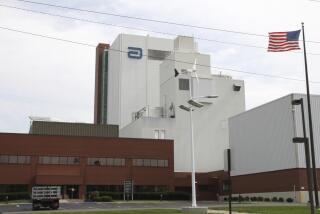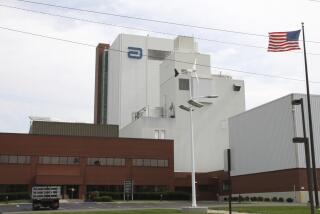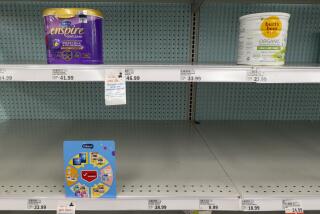That ‘Baby Formula’ Factory--U.S. Calls It Chemical Arms Site : Television: Peter Arnett describes visit to destroyed facility. Military authorities dispute his account.
- Share via
WASHINGTON — Did the allies bomb Iraq’s only infant formula plant? Or was it really a biological weapons factory in disguise?
That question provided the latest skirmish in the propaganda war between Iraq and the multinational forces in the Persian Gulf War.
Early Wednesday, Cable News Network reporter Peter Arnett, the only Western reporter still allowed in Iraq, reported that he had been taken to what Iraqi authorities described as a baby formula factory that had been destroyed in allied bombing.
“It was the only source of infant formula food for children one year and younger in Iraq,” Arnett said in the telephone report, labeled as having been cleared by Iraqi censors. “The steel girders that had been holding up the building were twisted and blackened, and the machinery inside was a molten pile. The intact signboard at the entrance of the factory read ‘Baby Milk Plant’ in English and Arabic.”
Military information officers in Saudi Arabia had no comment at first when asked about the report, but within a few minutes, they had an update:
“Apparently this facility, by what we’ve just learned, has military guards around it, a barbed-wire fence,” Lt. Col. Mike Gallagher said. “It has a military garrison outside, and numerous sources have indicated that the facility is associated with biological warfare production.”
By afternoon White House Press Secretary Marlin Fitzwater was telling reporters that the factory “is, in fact, a production facility for biological weapons.”
“The Iraqis have hidden this facility behind a facade of baby milk production as a form of disinformation,” Fitzwater said.
When asked what substantiation he had, Fitzwater said: “We’ve had information on this for a long time. I cannot share it with you, for intelligence reasons, but it certainly is our conclusion. We’re confident of our information.”
One odd feature of the story is that in September, Iraqi officials allowed another CNN reporter, Richard Roth, to tour a state-owned dairy. At the time, according to Ed Turner, CNN’s executive vice president for news, Roth thought the factory suspicious, and he “did a piece that questioned what the dairy was being used for, noting, among other things, that the uniforms dairy workers wore looked brand-new and were printed in English.”
It is possible, Turner said, that this factory is the same one, because Iraqi officials told Arnett Wednesday that CNN had visited the plant “last August.” CNN was still looking into the possible coincidence.
Beyond this one story, the White House also sought to cast doubt on any reporting coming out of Iraq over CNN, although it did not direct its criticism at the cable network itself.
“We must point out once again that any reports coming out of Baghdad are in effect coming from the Iraqi government,” Fitzwater said. “This is not a case of taking on the media. It’s a case of correcting a public disclosure there that is erroneous, that is false, that hurts our government and that plays into the hands of Saddam Hussein.”
Fitzwater was asked if he made any distinction between Iraqi censorship and censorship by Israel or the U.S. policy of approving news reporters’ pooled reports before they are made public.
“I don’t think anybody believes they’re the same,” he replied.
Turner of CNN said that “in his two reports on this today, Peter Arnett reported what the Iraqis said,” neither confirming nor denying its validity.
But Turner did acknowledge that Arnett may have gone too far in the report. “At one point Peter did say it (the factory) looked innocent. . . . He was ad-libbing at the time. That was a mistake.”
Turner added that Arnett’s tour of the facility was tightly restricted.
Times staff writers James Gerstenzang and Rena Miller in Washington also contributed to this story.
More to Read
Sign up for Essential California
The most important California stories and recommendations in your inbox every morning.
You may occasionally receive promotional content from the Los Angeles Times.













